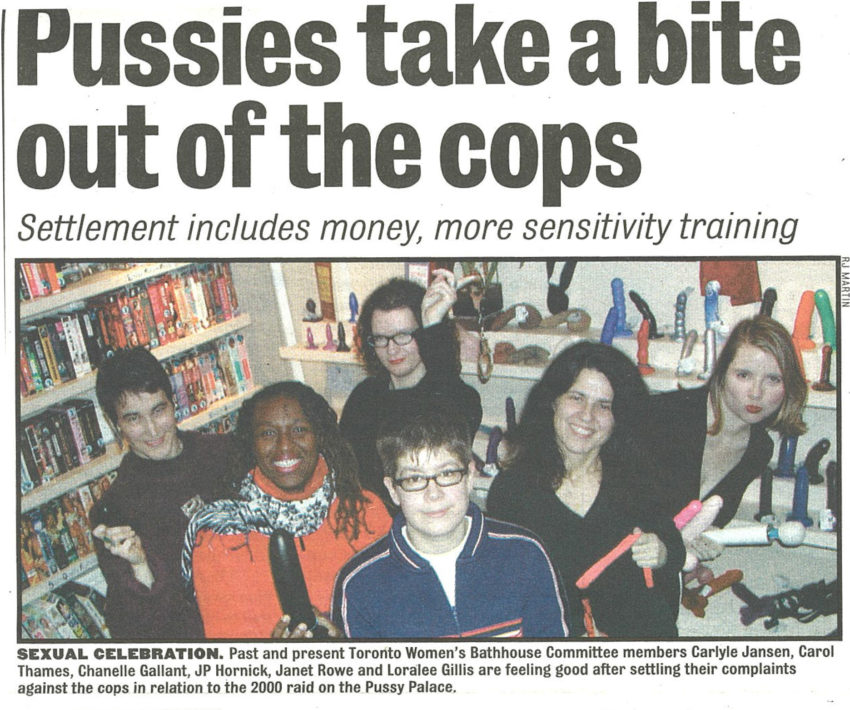By Jessica Taylor and Ami Powell
Initially a project of the AIDS Committee of Toronto, the Toronto Women’s Bathhouse Committee began running bathhouse parties, nicknamed Pussy Palace in their early incarnations, for women (both cis and trans) and trans men in Toronto in 1998. These bathhouse parties opened up new space for queer women in Toronto, and in Canada more generally. The ArQuives’ collection includes numerous newspaper and magazine articles detailing a significantly important event in Toronto’s queer history: the Pussy Palace Raids.
On September 14th, 2000, the Pussy Palace event “2000 Pussies” at Club Toronto was raided by Toronto police. Two undercover female police officers were sent inside first to investigate the event. After midnight, five plainclothes male police officers then searched the club, including private rooms, for an hour and a half, ostensibly checking for liquor license violations. They did not give significant warning to the around 350 attendees, many of whom were nude or semi-clad, and threatened obstruction charges if women warned others in yet-raided parts of the club.

The raid was a violation of queer women and trans men’s privacy, masquerading as a liquor license check. An article by Vern Smith in Eye Weekly quotes Nancy Erwin, who describes the evening: “Suddenly men appeared, and it’s pretty shocking to have a bunch of men wandering through a private women’s bathhouse. Many women were scared, but I expected [the police] to leave rather quickly… But they circulated through again and again. They behaved in what I would consider inappropriate ways. One woman had to ask an officer if she could help him when he was stuck in a gaze at her naked breasts.”
Protests from the Women’s Bathhouse Committee and the queer community were swift to emerge. The committee held a meeting at the 519 Community Centre, which lead to a march down to police headquarters. Coverage of the Pussy Palace raid linked it back to the 1981 Toronto bathhouse raids on gay male bathhouses, as well as the more recent 1999 police raids on the Bijou and 2000 raids on the Barn, and gay male activists got involved in supporting the protests. Two of the volunteers, Rachel Aitcheson and JP Hornick, were charged with liquor license violations, and by 2002 their legal costs had amounted to $60,000.
The creativity and resourcefulness of Toronto’s queer community shined in both fundraising and protest organizing. Fundraising on behalf of the Women’s Bath House Defense Fund to cover legal fees ranged from a wild party at Pope Joan (a now closed lesbian bar) to an expensive oyster dinner mingling with politicians, and protests included a “panty picket,” where over 100 protesters shook their underwear at the police’s 52 Division offices while chanting “keep your hands off our panties!” In an article from a November 2000 issue of Xtra, Rachel Giese wrote, “Combining the best of the activism of the past with their own distinct style, the bathhouse defense women have reinvigorated queer politics in Toronto. Opposition to police harassment may have never before involved panty pickets, oysters and drag kings. But that may be just what’s needed to get the job done.”
In January 2002, the charges against Aitcheson and Hornick were dismissed by a judge, who agreed that their constitutional rights and those of attendees had been violated by the raid, comparing the male police officers’ entry into the bathhouse to a strip-search. An Ontario Human Rights Commission complaint and class-action suit against the police filed by the Women’s Bathhouse Committee was settled in 2005, resulting in a $350,000 settlement which went to legal fees and to charity.
The Toronto Police LGBT Consultative Committee came out of the back and forth between the queer community, police, media, and politicians following the raids. In 2016, Toronto police chief Mark Saunders apologized for past bathhouse raids, specifically the 1981 raids. A number of women involved in the Pussy Palace raid, however, argued that neither the Toronto Police Services committee nor an apology involved enough plans for change within the TPS to make them meaningful. Alongside being a crucial piece of Toronto’s queer history, the raid speaks to the larger themes of police relations and community organizing. Next year, the ArQuives will honour the 20th anniversary of the Pussy Palace raid.

